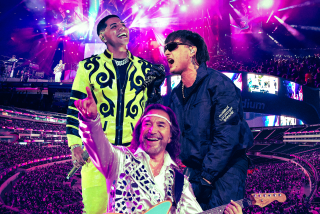The Wild Bunch
It’s just past midnight at Dragonfly, a 400-capacity club in Hollywood and the Thursday night home of the band Ozomatli. The air is thick with smoke and sweat, and if one more body is squeezed into the low-key club, it’s going to burst. But the crowd isn’t tense. The people are festive and mellow--all ready to get their weekly Ozo fix.
Voices from the back of the club begin yelling, “Yeah!” and “Ahhhhhhh!,” signaling the samba’s about to begin. Suddenly, the sounds of distant conga drums and clashing cymbals begin to fill the air, a whistle blows and the 11 members of Ozomatli are snaking their way through the crowd in the form of a makeshift soul train.
The audience, a pastiche from L.A.’s cultural corners, knows the drill and is ready for the two-hour ride of what Ozo dubs “the people music”--a smooth and sometimes chaotic blending of horns, congas, drums, turntables, vocalists, MCs, whistles and a few other instruments.
For Ozomatli, what’s happening onstage isn’t the whole story. It’s the band of the moment, the hottest in L.A.’s thriving club scene, famous for its on- and offstage antics, which can include leaving the club altogether and performing in the streets.
In a year, Ozo has gone from playing local benefits to selling out Hollywood’s most popular clubs.
“They offer a really pure form of entertainment,” says Brent Bolthouse, the Opium Den’s owner, who began booking Ozo in January last year. “The only thing to compare them to are groups from the ‘70s, the Wars, the soul groups--kids are still screaming for them almost 30 years later.”
Within months of Ozomatli’s debut at Hollywood’s Opium Den, folks began clamoring for more and the group moved up the street to the larger-capacity Dragonfly. In June, the band inked a deal with the independent record label Almo Sounds, no small feat for a band that has more members than parliament, sings in Spanish and wears its left-leaning politics on its rolled-up sleeve.
Perhaps even more exciting for the band was being asked to perform on the second stage at KROQ-FM’s Weenie Roast & Luau (the only Latin-based band at the daylong concert) and on the main stage of H.O.R.D.E., the blues-based festival Neil Young is headlining this year.
Ozo’s sound has been labeled “Latin/salsa/hip-hop/funk,” but the description doesn’t really do justice to the band’s seamless blending of Caribbean rhythms, African drumbeats, traditional Mexican music and its defiantly youthful attitude. To be sure, when 11 people from a variety of regional, ethnic and musical backgrounds team to create music, they don’t fit neatly into labels found in the rock critic’s handbook.
“We have a deep reverence and awe for the archaic traditions of our music, of salsa, samba,” says Ulises Bela, the group’s tenor sax player. “But we also love all the modern sounds, which is hip-hop, funk, whatever we feel like. . . . It trips people out. A lot of them are still trying to decipher us.”
Anyone looking for the next Grateful Dead could place their bets on Ozomatli. Check out a show. Fans groove to Ozo like Deadheads do to “Sugar Magnolia.” As with the band that launched a zillion hippies, Ozomatli has an essence of soul that transcends the music it plays.
That quality is what fans are responding to. Perhaps, then, the genesis isn’t surprising for a group of guys who chose to pose for Calendar in front of a police car.
Wil-Dog, the 23-year-old founder of Ozomatli and its most outspoken member, was working at a public youth jobs agency when he joined others in protesting working conditions for the young people and the firing of the group’s leader because of differing philosophies on how to train students.
On March 12, 1995, the protesters staged a sit-in and Wil-Dog began writing political songs. On that same day Ozomatli’s future lead singer and guitarist, Raul Pacheco, moved back to Los Angeles after abandoning a career working for a political consultant in Sacramento. He rekindled a friendship with Wil-Dog and one of his co-workers who played drums. They found other musicians by word of mouth.
“By the time the month was over, Ozomatli was born and we had our first gig on April 1,” Wil-Dog says. (The name comes from the Nahuatl Indian word for the God of dance and appears on the Aztec calendar in the form of a monkey.)
The group, whose members range from their early 20s to 30s, began by playing benefits. “We were dedicated to political rallies, political events, protests, and we just did it from there,” he says.
But beyond the message there was the music.
“We throw people a curve,” says Bela, who grew up in Bell and is on leave from his studies at Cal State Long Beach. “We’ll make them dance, we’ll make them have a helluva good time, and then we’ll drop something on them. We don’t take a hard-core political stance on stage, we all have different political points of views.”
Its members, who are Mexican American, Japanese, Jewish, African American and Cuban, include a political activist, a schoolteacher, a used-car salesmen and a former member of Disneyland’s “Lion King” parade. The group is rounded out by Jose Espinosa (alto sax), Asdru Sierra (trumpet), Pablo Castorena (trombone), DJ Cut Chemist, Jiro Yamaguchi (percussion), Justin Poree (congas/percussion), William Marrufo (drums/vocals) and MC Chali 2na (a rapper).
“We represent all the ghettos of L.A.,” Wil-Dog says. “We want to make a change in our neighborhoods, show people a positive way to live.”
“What represents us, as Ozomatli, is I find beauty in the African American culture as well as my own,” Pacheco says. “In the Japanese culture and the white culture. When Chali 2na raps, man, that’s us, too. Whatever he’s saying, that’s me.”
Chali 2na, who is originally from the South Side of Chicago, says: “I have a strong belief in God and feel we’re all different simply to learn from each other.”
Sierra, who grew up in East L.A., says there’s more for him than the music. “We played a benefit in Watsonville, [Calif.], and I didn’t know anything about people who were dying from pesticide. Where I come from, everybody was just dying by guns. Everybody was killing each other, and that’s all I knew. . . . When I joined this band, I started to learn about troubles other than mine.”
Whether or not you understand Spanish, when Ozomatli performs, the band’s experiences are evident in the music. It doesn’t matter if it’s playing a traditional Mexican ballad or encouraging Chali 2na with a drum-filled, horn-drenched frenzy to drop some South Side knowledge, Ozomatli gets its point across.
“We break a lot of rules in the music that we play,” Pacheco says. “All of it has a strict tradition . . . and people who are around things in pop culture can’t always relate to tradition. But we bring out a deejay, or Chali starts rapping in the middle of a cumbia, or Yamaguchi breaks into classical Indian music.”
While the band’s members are excited about the opportunity to record a full-length album on a major label--they already have a four-song EP--they say they won’t let it get in the way of their mission.
“If this record deal helps us take our music to the world, then good,” Bela says. “But if they hold us back, then forget that. We’re outta there.”
BE THERE
Ozomatli performs Thursdays at the Dragonfly, 6510 Santa Monica Blvd., Hollywood, (213) 466-6111. 21 & over, $7 cover; Also, July 17, on H.O.R.D.E. tour main stage at the Irvine Meadows Amphitheatre, $30, (714) 855-4575.
More to Read
The biggest entertainment stories
Get our big stories about Hollywood, film, television, music, arts, culture and more right in your inbox as soon as they publish.
You may occasionally receive promotional content from the Los Angeles Times.










